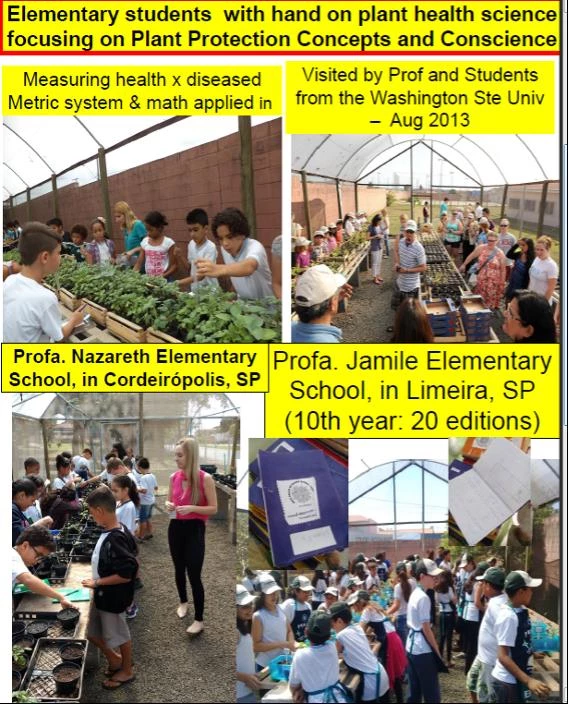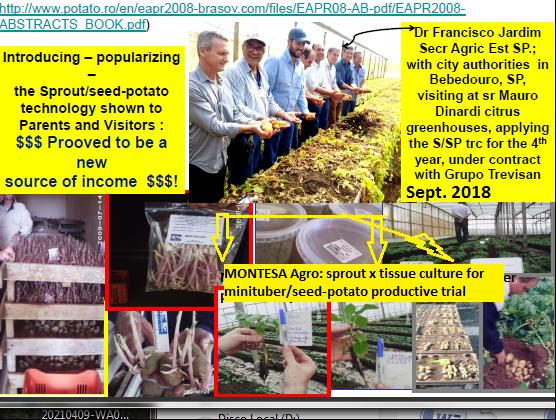Introduction:
The PPWSP aims to act on introducing an early and precautious conscience toward protecting Brazil's agriculture from within or outside movement of exotic-quarantine plant viruses. It was motivated by learning from economic-social-environmental damages due to introduction, establishment, and spread of quarantine potato viruses (Solanum tuberosum) on seed-potato production (ex.: Potato virus YNTN - PVYNTN, from Canadian imported seed-potato lots, turning unmarketable a then major potato cvs: 'Monalisa'). Considering these matters as a need of "hygiene" practices pro agriculture, the PPWSP methodology focus on teaching plant health science while building hygiene conscience about the danger of virus spreading via movement of not certified (sanitary unknown) plant propagating materials: seed, cuttings, stem, tubers, sprouts etc. Students (9-11 years old), at fundamental schools, are guided to put "hands and minds" on basic plant health science concepts. Potato sprouts detached from seed-potato tubers, pre-identified as healthy or perpetuating common virus (PVY and/or Potato leafroll virus - PLRV), are used as "seed" (propagating material). Each student watch (take notes) of two or four plants growing healthy x one virus infected. As potato are only 80-day life cycle (allowing 2 PPWSP/year) and the viruses causes fast and easy visible symptoms, each students is taught to observe, compare and measure plant germination (growth) foliage/tuber development, as well recognize (draw) diseased plants and insects (aphids, whiteflies, etc) as virus transmitters (vector). The PPWSP activities are performed in scientific-like greenhouse; currently it has been carried out successfully in two municipal schools in the cities of Limeira and Cordeirópolis (SP). In conclusion, we consider that PPWSP plays a fundamental contribution toward plant protection, pro Brazilian agriculture, by building an early plant protection conscience on preventing plant virus movements such as human brought into home garden and winged insect vectors taking into farm plantations. It is considered an innovative, precocious, learning to be carried-applied-spread for a life span; perpetuated from child to adulthood. We hope the PPWSP will continue to work along these lines on the basis of a precautious and science-based approach. Let’s spread the PPWSP to fundamental schools for the sake of a continued Brazilian agro-prosperity (FUNDAG/MICROGEO, GRUPO TREVISAN supported).
Material and Methods:
The PPWSP activities are performed in scientific-like greenhouse; currently it is being carried successfully in two municipal schools. Each student (2-3 x/week) monitor 2-4 health x 1 virus infected potato plant (Solanum tuberosum), comparing: steam-leaves-tuber size, weight, quantity. Students (9- 11 years old) puts "hands and minds" on basic plant health science concepts. Potato sprouts are detached from common virus (+) seed-potato tubers, and planted, i.e., used as propagating material (ref.: 2, 4) : sprout/seed-potato to grow healthy x virus infected plants. As potato are only 80-day life cycle (allowing 2 PPWSP/year) and virus (PVY) cause fast and easy visible symptoms each students is taught to observe, compare and measure plant germination (growth) foliage/tuber development, as well recognize (draw) diseased plants and insects (aphids, whiteflies, etc) as virus transmitters (vector). The role insects (aphids, whiteflies, trips) play on transmitting viruses from sick to health plants (from home garden to farm crops) is demonstrated at the "Transmission Day", which takes place at the 40-50th days.
Results & Discussion:
The potato has shown to be an ideal plant for the goals of this educational & technology transfer project: (1) cycle of 80-90 days = school period; (2) susceptible to many insect-transmitted virus diseases (ex.: PVY, PLRV), allowing comparative (health x sick) notes on symptoms/growth; mathematics and metric system application; (3) vegetative (tuber) propagation, demanding annual import of virus-free tuber/seed-potato stocks renewal, adding a real risk of introducing-spreading new or quarantine tuber/soil-borne pathogens and pests. The last, but not the least, is a major sanitary concerning factor for potato production in Brazil, as well as all countries that are dependent of propagating material (seed-potato) from other countries (annual imports). Thus, instead of planting whole tuber/seed-potato (conventional), students learn that planting sprouts only, detached from virus-free tuber/seed-potatoes, can be another (innovative), more sanitary safe "seed-potato". This is what the IAC-Sprout/Seed-Potato Technology has been revealing to the seed-potato import-export market, a world-wide mare safety movement (refs.: 2,4,5 7). The digging potato tubers for final comparisons are followed by taking, saved at dark and cold room storage for further planting (virus-free minituber/seed-potato) hem to home or community garden (urban-farming). Imagine that: Virus-free minituber-seed potato (sample) being planted by young (elementary school) students produced while learning to "play" with science-technology-innovation (More science, less dependence).
Conclusions:
(1) PPWSP plays a fundamental contribution toward plant protection, pro Brazilian agriculture;
(2) Build early plant protection conscience on preventing plant virus moving from home garden into farm plantations, as life span and perpetuated lesson. For the sake of a Brazilian agro-prosperity, lets spread the PPWS Project to fundamental schools all over Brazil. The PPWS project has been an innovative approach toward exposing elementary school students into basics of scientific work through an early hands-on plant health x diseases (viruses) manipulation; and
(3) Being internationally recognized (ref. 8), the PPwS project has been tutoring discussions among plant pathologists, teacher, parents, education authorities, agronomists and common people on the importance and impact of plant protection to the Brazilian agro-economical-social-environmental continued prosperity. The PPwS project can be instrumental on effective-integrated plant-protection actions, raising young plant protection guardians whose uniform is conscience and perception of what plant protection is all about.
More plant science, less hunger anxiety.
References:
1) Projeto Plantando Batata com Ciência Escola Munic Limeira Prof Jamile (30.jan.2015). Disponível em: http://carambatatasemvirus.blogspot.com.br/2015/01/projeto-plantando-batata-com-ciencia.html. Acesso em: 22.set.2022.
2) Souza-Dias et al., 2008. The spoute/seed-potato technology: A review on the innovative idea of exporting/importing sprouts for sanitary movement of virus-free "seed-potato" stocks Disponível em: https://carambatatasemvirus.blogspot.com/2020/09/the-sproutseed-potato-technology-review.html. Acesso em: 22.set2022.
3) Microgeo - Projeto Plantando Batata com Ciência. 13.abr.2018. Disponível em: https://www.youtube.com/watch?v=Ac--vVqNwEg&t=3s. Acesso em: 22.set.2022.
4) Moraes, E.; T.L. Factor & J.A. Caram de Souza-Dias. 2022. Relato sobre o Sucesso do 56° Ciclo de Palestra "Alvaro Santos Costa" sobre Novos cultivares, Viroses e Tecnologia IAC-Broto/Batata-semente. Revista Batata Show (Itapetininga, SP), 22(63):79-80 (https://carambatatasemvirus.blogspot.com/2022/08/56-ciclo-de-palestras-alvaro-santos.html)
5) Caram Batata sem Vírus. Disponível em: https://www.facebook.com/carambatatasemvirus/. Acesso em: 22.set.2022.
6) Tecnologia IAC do broto/batata-semente - Economia e eficiência na bataticultura. 10 de julho de 2020. Disponível em: https://www.youtube.com/watch?v=NCCikBSiFLo. Acesso em: 22.set.2022.
7) Broto/Batata-Semente: Antes Lixo, Agora Semente e Renda. Disponível em: <https://transforma.fbb.org.br/tecnologia-social/broto-batata-semente-antes-lixo-agora-semente-e-renda>. Acesso em: 22.set.2022.
8) Feldmann, F. 2013. Experts, go to school! Interview with Dr José Caram de Souza Dias. Phytomedizin - 43 - Jahrgang Nr 3: 8-9 (https://carambatatasemvirus.blogspot.com/2019/01/ensinando-ciencias-estudantes-do-nivel.html)
9) Souza-Dias, J.A.C.de; K. Lindner, V.J. Ramos;A. A. Costa, X. Qinqfen, W. Wei, C. Martinho, D. Chougourou, 2011. The Sprout/Seed-Potato (S/S-P) Technology: An update on attempts to transfer this affordable minituber PRODUCTION system to developing nations. In: Santala, J & Valkonen, J.P.T. 18th Triennial Conf. EAPR, Oulu, Finland, July 24-29, 2011. Book of Abstracts. p.49 (https://portal.mtt.fi/portal/page/portal/kasper/pelto/peruna/Potatonow/eapr/eapr2011/htdocs/media/assets/eapr_abstract_book_18_07_11.pdf)
*******
How to cite: José A. Caram de Souza-Dias (1), Paulo A. D'Andrea (2), Lucivânia G. S. Rodrigues (3), M. Cristina R. Oliveira (3), Andrea G. Ferreira (3), Angelina M. Ortolan (4), Silvana A. Mello (4), Ana Lucia M. G. Bocatto (4), Erik A. Paiola (4). The Planting Potato with Science Project (PPWSP): A volunteer fundamental school science educational project using potato viruses to build plant protection conscience. (1) IAC - APTA, CPD Fitossanidade. Campinas, SP; (2) MICROGEO. Cond. Ind. Duas Barras, Limeira,SP; (3) CEIEF - Jamile Caram S. Dias, Limeira,SP; (4) MEIEF - M. Nazareth S. Lordello, Cordeirópolis.SP; email: jcaram@iac.sp.gov.br. Apresentado na forma de pôster no XXIX Congresso Brasileiro de Virologia (Gramado, RS, 17-21/10/2018). Agriporticus. Disponível em: https://agronomicabr.com.br/DetalheAgriporticus.aspx?id=2066. Acesso em: 22.set.2022 (Atualizar a data de acesso).






